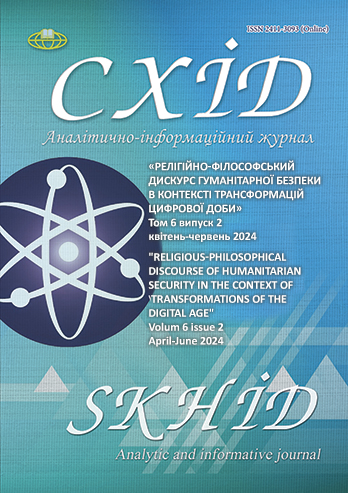Internet generation in religious cyberspace: worldview challenges of the digital age
DOI:
https://doi.org/10.21847/2411-3093.623Keywords:
religious cyberspace, digital religion, cyber religion, online religion, Internet generation, social networks, cyber governance, religious information warsAbstract
The article is devoted to the analysis of the peculiarities in the perception of reli-gious cyberspace by the Ukrainian Internet generation. The relevance and novelty of the research consists in determining the specifics of the religious cyberspace func-tioning in the context of the spiritual and intellectual needs of the Internet generation, clarifying the essence of worldview challenges that the globalized digital age poses to young people in the religious cyberspace. The peculiarities of the religious cyber-space formation in the Ukrainian and world context are analyzed. It is noted that functioning of the virtual religious space can be considered through several key as-pects: online worship, virtual prayers, educational programs of spiritual develop-ment, platforms for discussing religious topics and sharing experiences in social networks, electronic libraries, digital missionary programs, virtual pilgrimage, the use of various mobile applications for prayer practices, etc. The peculiarities of the digi-tal religion phenomenon are defined as a dynamic process in which religious groups and individuals adopt digital technologies and adapt to them depending on their values and capabilities. The essential features of the Internet generation, the specif-ics of its intellectual and spiritual requests, and self-presentation in religious cyber-space are analyzed. The challenges and dangers produced by religious cyberspace in the modern globalized era are characterized. The Conclusions state that religious cyberspace provides the Internet generation with unique opportunities for spiritual growth, learning, communication and active participation in religious life, however, the safe use of religious cyberspace is possible through digital culture and continu-ous self-education. Among the measures of counter social manipulations and reli-gious extremism in the online space are educational programs aimed at raising awareness of different religions and culture, which promotes tolerance and mutual understanding, development of media culture and critical thinking among users of religious cyberspace, active use of social media to spread positive and truthful reli-gious content, creation of mechanisms for checking facts and exposing disinfor-mation in the religious sphere.
Downloads
References
Epafras, L. C., Hendrikus P. K., Jemali, M., Setyono, V. S. (2020). Transitional Religiosity: The Religion of Gen-eration Z. European Union Digital Library. Proceed-ings Series Journals Search EAI. https://doi.org/10.4108/eai.2-11-2020.2305063
Evolvi, G. (2022). Religion and the internet: digital reli-gion, (hyper)mediated spaces, and materiality . Z Re-ligion Ges Polit. 6. 9–25 https://link.springer.com/article/1¬0.1007/s41682-021-00087-9
Fylypovych, L. (2001). The modern religious situation and the Ukrainian Internet. Religious freedom: mass media, school and church as social factors of affirmation. 2001. 5. 88 – 89 (In Ukrainian)
Generation Z. Within the Workforce and in the Work-place: A Bibliometric Analysis. Fron-tiers in Psychol-ogy. 2021. 12. https://doi.org/10.3389/fpsyg.2021.736820
Kozyriatska, S. (2017). Online Christian editions of the Ukrainian media space. Zaporizhzhia: Prosvita.192 с. (In Ukrainian)
Lomachinska, I., Lomachynskyi, B. (2022) The role of media culture in modern information wars. SKHID. 3(3). 66 – 73 https://doi.org/10.21847/1728-9343.202 (In Ukrainian)
Lomachinska, І., Lomachinskyi, В. Digital culture in scientific libraries. SKHID. 2024. 6 (1). 34 – 35 https://doi.org/10.21847/2411-3093.2024.6(1).300430
Lomachіnska, I., Hryshyna, Y. The Іnternet generation and consciousness wars of today. Visnyk of the Lviv University. Series Philos.-Political Studies. 2024. 52. 161–168 https://doi.org/10.30970/PPS.2024.52.19 (In Ukrainian)
Mansour, N. (2022). The Holy Light of Cyberspace: Spir-itual Experience in a Virtual Church. Religions. 13 (121) https:// doi.org/10.3390/rel13020121
Munir, Т., Sutrisno, Lumingkewas, M. S. (2023). Internet and religion: digital deities and technoshamanism changing our understanding of spirituality. Jurnal Teologi dan Pendidikan Kristen. 4. (2). 119-135 https://doi.org/10.55076/didache.v4i2.136
Petrushkevych М. New media and the possibilities of a dialogue in mass religious communication. Visnyk Cherkaskoho universytetu. 2017. 2. 24 – 32 https://eprints.cdu.edu.ua/2652/1/2278-5733-1-SM.pdf
Siuda, P. (2021). Mapping Digital Religion: Exploring the Need for New Typologies. Religions. 12 (373) https://doi.org/ 10.3390/rel12060373
The Church and the Internet. Document of the Pontifical Council for Social Communication (2015). Scientific notes of UKU. Journalism. Media communications.7. 179-191(In Ukrainian)
Tsuria, R. (2021). Digital Media: When God Becomes Everybody—The Blurring of Sacred and Profane. Religions. 12 (110). https://doi.org/10.3390/rel12020110
Yilmaz, I, Saleem, R. M A., Pargoo, M., Shukri, S., Ismail, I., Shaki, K. (2022). Religious Populism, Cyberspace and Digital Authoritarianism in Asia: India, Indonesia, Malaysia, Pakistan, and Turkey. European Center for Populism Studies. Brussels, Belgium. 01-01 https://doi.org/10.55271/5jchdy
Downloads
Published
How to Cite
Issue
Section
License
Copyright (c) 2024 Ірина Ломачинська, Юлія Гришина

This work is licensed under a Creative Commons Attribution-NonCommercial-NoDerivatives 4.0 International License.
1. Authors bear responsibility for the accuracy of facts, quotations, numbers and names used.
2. Manuscripts are not sent back.
3. The publisher does not always agree with the authors' opinion.
4. The authors reserve the right to authorship of the work and pass the first publication right of this work to the journal under the terms of a Creative Commons Attribution-NonCommercial-NoDerivatives 4.0 International License. This license allows others to distribute (copy) the published work for non-commercial purposes, provided there is mandatory attribution to its authors and a link to the first publication in our journal.
5. The authors have the right to conclude separate supplement agreements that relate to non-exclusive work distribution in the form in which it has been published by the journal (for example, to upload the work to the online storage of the journal or publish it as part of a monograph), provided that the reference to the first publication of the work in this journal is included.

